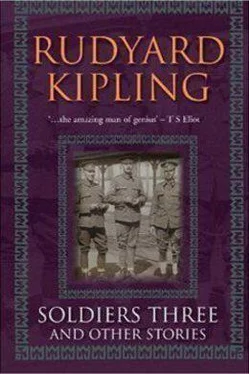Rudyard Kipling - Soldiers Three
Здесь есть возможность читать онлайн «Rudyard Kipling - Soldiers Three» весь текст электронной книги совершенно бесплатно (целиком полную версию без сокращений). В некоторых случаях можно слушать аудио, скачать через торрент в формате fb2 и присутствует краткое содержание. Год выпуска: 2014, Издательство: epubBooks Classics, Жанр: Классическая проза, на английском языке. Описание произведения, (предисловие) а так же отзывы посетителей доступны на портале библиотеки ЛибКат.
- Название:Soldiers Three
- Автор:
- Издательство:epubBooks Classics
- Жанр:
- Год:2014
- ISBN:нет данных
- Рейтинг книги:5 / 5. Голосов: 1
-
Избранное:Добавить в избранное
- Отзывы:
-
Ваша оценка:
- 100
- 1
- 2
- 3
- 4
- 5
Soldiers Three: краткое содержание, описание и аннотация
Предлагаем к чтению аннотацию, описание, краткое содержание или предисловие (зависит от того, что написал сам автор книги «Soldiers Three»). Если вы не нашли необходимую информацию о книге — напишите в комментариях, мы постараемся отыскать её.
Soldiers Three — читать онлайн бесплатно полную книгу (весь текст) целиком
Ниже представлен текст книги, разбитый по страницам. Система сохранения места последней прочитанной страницы, позволяет с удобством читать онлайн бесплатно книгу «Soldiers Three», без необходимости каждый раз заново искать на чём Вы остановились. Поставьте закладку, и сможете в любой момент перейти на страницу, на которой закончили чтение.
Интервал:
Закладка:
So she took her sitar and sat in the window–seat and sang a song of old days that had been sung by a girl of her profession in an armed camp on the eve of a great battle—the day before the Fords of the Jumna ran red and Sivaji fled fifty miles to Delhi with a Toorkh stallion at his horse's tail and another Lalun on his saddle–bow. It was what men call a Mahratta laonee , and it said:―
Their warrior forces Chimajee
Before the Peishwa led,
The Children of the Sun and Fire
Behind him turned and fled.
And the chorus said:—
With them there fought who rides so free
With a sword and turban red,
The warrior–youth who earns his fee
At peril of his head.
'At peril of his head,' said Wali Dad in English to me. 'Thanks to your Government, all our heads are protected, and with the educational facilities at my command'—his eyes twinkled wickedly—'I might be a distinguished member of the local administration. Perhaps, in time, I might even be a member of a Legislative Council.'
'Don't speak English,' said Lalun, bending over her sitar afresh. The chorus went out from the City wall to the blackened wall of Fort Amara which dominates the City. No man knows the precise extent of Fort Amara. Three kings built it hundreds of years ago, and they say that there are miles of underground rooms beneath its walls. It is peopled with many ghosts, a detachment of Garrison Artillery and a Company of Infantry. In its prime it held ten thousand men and filled its ditches with corpses.
'At peril of his head,' sang Lalun again and again.
A head moved on one of the Ramparts—the gray head of an old man—and a voice, rough as shark–skin on a sword–hilt, sent back the last line of the chorus and broke into a song that I could not understand, though Lalun and Wali Dad listened intently.
'What is it?' I asked. 'Who is it?'
'A consistent man,' said Wali Dad. 'He fought you in '46, when he was a warrior–youth; refought you in '57, and he tried to fight you in '71, but you had learned the trick of blowing men from guns too well. Now he is old; but he would still fight if he could.'
'Is he a Wahabi, then? Why should he answer to a Mahratta laonee if he be Wahabi—or Sikh?' said I.
'I do not know,' said Wali Dad. 'He has lost, perhaps, his religion. Perhaps he wishes to be a King. Perhaps he is a King. I do not know his name.'
'That is a lie, Wali Dad. If you know his career you must know his name.'
'That is quite true. I belong to a nation of liars. I would rather not tell you his name. Think for yourself.'
Lalun finished her song, pointed to the Fort, and said simply: 'Khem Singh.'
'Hm,' said Wali Dad. 'If the Pearl chooses to tell you the Pearl is a fool.'
I translated to Lalun, who laughed. 'I choose to tell what I choose to tell. They kept Khem Singh in Burma,' said she. 'They kept him there for many years until his mind was changed in him. So great was the kindness of the Government. Finding this, they sent him back to his own country that he might look upon it before he died. He is an old man, but when he looks upon this country his memory will come. Moreover, there be many who remember him.'
'He is an Interesting Survival,' said Wali Dad, pulling at the huqa . 'He returns to a country now full of educational and political reform, but, as the Pearl says, there are many who remember him. He was once a great man. There will never be any more great men in India. They will all, when they are boys, go whoring after strange gods, and they will become citizens—"fellow–citizens"—"illustrious fellow–citizens." What is it that the native papers call them?'
Wali Dad seemed to be in a very bad temper. Lalun looked out of the window and smiled into the dust–haze. I went away thinking about Khem Singh who had once made history with a thousand followers, and would have been a princeling but for the power of the Supreme Government aforesaid.
The Senior Captain Commanding Fort Amara was away on leave, but the Subaltern, his Deputy, had drifted down to the Club, where I found him and enquired of him whether it was really true that a political prisoner had been added to the attractions of the Fort. The Sub–altern explained at great length, for this was the first time that he had held Command of the Fort, and his glory lay heavy upon him.
'Yes,' said he, 'a man was sent in to me about a week ago from down the line—a thorough gentleman whoever he is. Of course I did all I could for him. He had his two servants and some silver cooking–pots, and he looked for all the world like a native officer. I called him Subadar Sahib; just as well to be on the safe side, y'know. "Look here, Subadar Sahib," I said, "you're handed over to my authority, and I'm supposed to guard you. Now I don't want to make your life hard, but you must make things easy for me. All the Fort is at your disposal, from the flagstaff to the dry ditch, and I shall be happy to entertain you in any way I can, but you mustn't take advantage of it. Give me your word that you won't try to escape, Subadar Sahib, and I'll give you my word that you shall have no heavy guard put over you." I thought the best way of getting at him was by going at him straight, y'know; and it was, by Jove! The old man gave me his word, and moved about the Fort as contented as a sick crow. He's a rummy chap—always asking to be told where he is and what the buildings about him are. I had to sign a slip of blue paper when he turned up, acknowledging receipt of his body and all that, and I'm responsible, y'know, that he doesn't get away. Queer thing, though, looking after a Johnnie old enough to be your grandfather isn't it? Come to the Fort one of these days and see him?'
For reasons which will appear, I never went to the Fort while Khem Singh was then within its walls. I knew him only as a gray head seen from Lalun's window—a gray head and a harsh voice. But natives told me that, day by day, as he looked upon the fair lands round Amara, his memory came back to him and, with it, the old hatred against the Government that had been nearly effaced in far–off Burma. So he raged up and down the West face of the Fort from morning till noon and from evening till the night, devising vain things in his heart, and croaking war–songs when Lalun sang on the City wall. As he grew more acquainted with the Subaltern he unburdened his old heart of some of the passions that had withered it. 'Sahib,' he used to say, tapping his stick against the parapet, 'when I was a young man I was one of twenty thousand horsemen who came out of the City and rode round the plain here. Sahib, I was the leader of a hundred, then of a thousand, then of five thousand, and now!'—he pointed to his two servants. 'But from the beginning to to–day I would cut the throats of all the Sahibs in the land if I could. Hold me fast, Sahib, lest I get away and return to those who would follow me. I forgot them when I was in Burma, but now that I am in my own country again, I remember everything.'
'Do you remember that you have given me your Honour not to make your tendance a hard matter?' said the Subaltern.
'Yes, to you, only to you, Sahib,' said Khem Singh. 'To you because you are of a pleasant countenance. If my turn comes again, Sahib, I will not hang you nor cut your throat.'
'Thank you,' said the Subaltern gravely, as he looked along the line of guns that could pound the City to powder in half an hour. 'Let us go into our own quarters, Khem Singh. Come and talk with me after dinner.'
Khem Singh would sit on his own cushion at the Subaltern's feet, drinking heavy, scented anise–seed brandy in great gulps, and telling strange stories of Fort Amara, which had been a palace in the old days, of Begums and Ranees tortured to death—aye, in the very vaulted chamber that now served as a Mess–room; would tell stories of Sobraon that made the Subaltern's cheeks flush and tingle with pride of race, and of the Kuka rising from which so much was expected and the foreknowledge of which was shared by a hundred thousand souls. But he never told tales of '57 because, as he said, he was the Subaltern's guest, and '57 is a year that no man, Black or White, cares to speak of. Once only, when the anise–seed brandy had slightly affected his head, he said: 'Sahib, speaking now of a matter which lay between Sobraon and the affair of the Kukas, it was ever a wonder to us that you stayed your hand at all, and that, having stayed it, you did not make the land one prison. Now I hear from without that you do great honour to all men of our country and by your own hands are destroying the Terror of your Name which is your strong rock and defence. This is a foolish thing. Will oil and water mix? Now in '57—'
Читать дальшеИнтервал:
Закладка:
Похожие книги на «Soldiers Three»
Представляем Вашему вниманию похожие книги на «Soldiers Three» списком для выбора. Мы отобрали схожую по названию и смыслу литературу в надежде предоставить читателям больше вариантов отыскать новые, интересные, ещё непрочитанные произведения.
Обсуждение, отзывы о книге «Soldiers Three» и просто собственные мнения читателей. Оставьте ваши комментарии, напишите, что Вы думаете о произведении, его смысле или главных героях. Укажите что конкретно понравилось, а что нет, и почему Вы так считаете.












